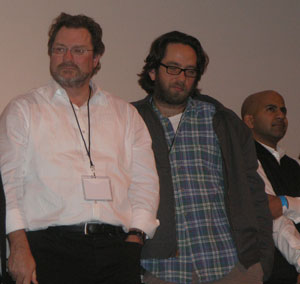
If you know these men by name, you're an Office Space geek.
Being a geek to me means loving something to the point of marginalization. Anything.

If you know these men by name, you're an Office Space geek.
Being a geek to me means loving something to the point of marginalization. Anything.
It’s hard to say whether or not a geek has come out of the basement, as one must define “the basement†before this statement has any purpose or meaning. It seems there are essentially two interpretations:
As an architecture and gaming (video, board, and RP) geek, the first interpretation interests me as physical space. Everything from the kitchen table to a home theater falls within this category. Some geeks only engage in their chosen hobby in a particular locale, either out of necessity (a video game console is generally required to play video games) or preference (the kitchen table has the memories of countless campaigns etched into its scarred surface). “Coming out,†in this case, generally means removing oneself from this ensconced location (or a similar venue) and going somewhere where the activity in question may be observed by those who do not participate. Perhaps this means a coffee shop for a pen-and-paper roleplaying group, or a gaming room at a convention (such as what Austin had during SXSW).
Other people will pursue their interests wherever and whenever they can. To them, space matters not, for the pursuit of the activity is tantamount. They still insulate themselves from the outside world, however, through their environs and/or companions. Gaming in the living room or the local hobby store is no different to the guy with his trusty dice bag and clip board of character sheets in his backpack. The second interpretation applies more to this type, as coming out of the basement means removing themselves from the protective bubble shielding them from what they interpret as the “outside.†An example for our dice-toter may be teaching his RPG-neophyte friends how to play D&D at home.
Naturally, these two interpretations are not mutually exclusive, and may depend on the hobby in question. As I mentioned earlier, some require special conditions or equipment, or they may require multiple people. Technology has a hand in blurring these lines, however. Thanks to portable game systems like the Nintendo DS and Sony PSP, a video gaming geek can “come out of the basement†in a park or on public transportation. Laptops, PDFs, and dice rolling programs allow RPG geeks to throw dice almost anywhere. Coming out of the basement, therefore, is getting easier to do. The preponderance of technology in our lives makes the executive sitting on the commuter train, staring and poking away at a little box cradled in his hands barely worth noting. Maybe he’s reviewing today’s meeting schedule on his Blackberry, but perhaps – just maybe – he’s finally tracked down that elusive, rare Pokemon.